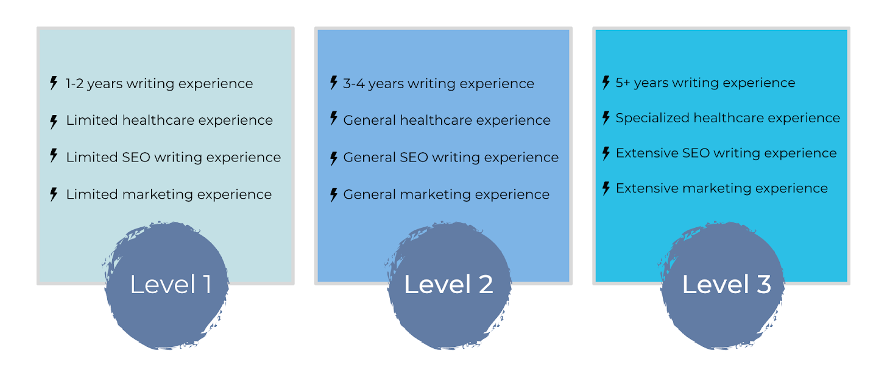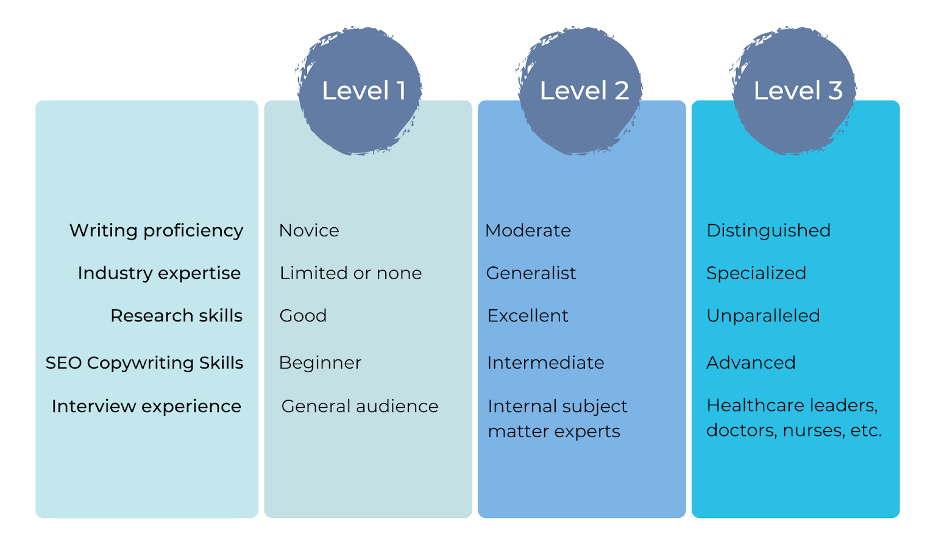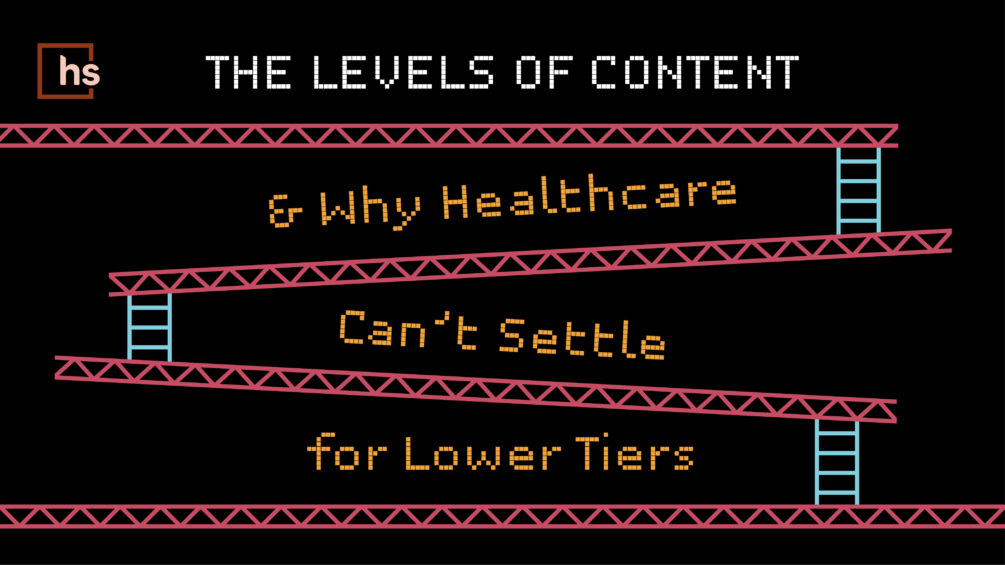The Levels of Content & Why Healthcare Can’t Settle for Lower Tiers
Content comes in levels or tiers, and your healthcare website requires the highest level.
Why? Writing high-quality content for healthcare that ranks high on Google and drives consumer action is hard.
What’s more, it requires the ability to make the right judgment call when faced with conflicting objectives and deep knowledge of several disciplines, including:
- Up-to-date medical facts and research
- Specialized industry sectors
- Dynamic Google algorithms and SEO requirements
- Unique brand tone, voice, and style
Consider a blog post on “the benefits of artificial grass.” This relatively easy topic is suitable for a novice writer with 1-2 years of professional web writing experience.
A service web page about the diagnosis and treatment of deep vein thrombosis as it relates to a specific healthcare practice, on the other hand…is not.
Low-quality content is risky for your business. Along with damaging your reputation among consumers and peers, it goes against Google’s quality standards for healthcare content.
In other words, it gets demoted in search.
While this post is not about defining quality content, it is about defining the content levels available today.
We also share what it takes to produce a strong writing style guide and the highest level of content required for your healthcare business.
Content Tiers: Defined
How do you create quality healthcare content?
Websites require a specific style of writing. In contrast to novelists, reporters, and academics, website content writers must share information as succinctly as possible while also helping the business reach its marketing goals.
Here, I break down three levels of content based on experience, technical skill, and industry expertise.

Let’s review each level in further detail.
Level 1 Writers
These are your novice writers, meaning they have little to no professional writing experience. While they may be proficient writers, they lack industry experience and expertise—two essential ingredients for healthcare marketing success.
“Content mills” often hire writers at this level to produce a high volume of low-quality or generic content for smaller businesses with limited budgets.
Their work can be vastly improved with procedural support from more experienced writers, editors, and proofreaders—provided these processes are in place at the business level.
(For the time being, AI-driven tools are also included in this level, but more on those next week.)
Level 2 Writers
Writers at this level are your generalists, meaning they may have some professional healthcare writing experience, but lack true expertise that can only come with experience.
These are up-and-coming writers who are beginning to understand how content dictates brand voice and tone and why it’s an essential part of integrated marketing and SEO strategies.
Like novice writers, their work can be significantly improved with procedural support from more experienced writers, editors, and proofreading specialists.
Level 3 Writers
Healthcare websites require the highest professional writing experience, marketing knowledge, and industry expertise.
These are your highly-skilled industry experts. They possess not only the writing proficiency and expertise needed to support your business goals but also a deep understanding of how content, marketing, and SEO work together to support
- Brand strategy
- Brand voice
- Messaging pillars
- High-intent audiences
- Conversions
- Credibility

High-Quality Healthcare Content is a Collaborative Effort
Writing for health care is complex. And quality writing doesn’t happen by magic (AI or otherwise).
This special editorial relationship allows experienced, senior-level content writers to produce high-quality, authoritative content for healthcare websites. It happens through close, collaborative relationships between your subject matter experts (most of whom are key stakeholders, physicians, and nurses) and writers. It can be broken down into three equal processes:
- The subject matter expert interview process
Experienced writers are highly skilled in communicating with and interviewing healthcare leaders and industry experts (e.g., decision-makers, administrators, physicians, nurse practitioners), marketing executives, and key stakeholders.
They know the right questions to ask and how to deliver the right content at the right length, time, and place.
- The review and approval process
The review and approval process is absolutely critical for high-quality content and maintaining high domain authority.
Even the most experienced and specialized writers need a certain level of support from industry experts. Review and approval from those intimately familiar with or skilled in the topics are extremely important to ensure the utmost accuracy and relevancy.
Advanced topics often include specialized services, new-to-market medical devices, and emerging techniques and technologies.
- The strategic process
Highly skilled writers are integral to a larger strategic team and are intimately involved in building a fully-integrated marketing strategy across your most effective distribution channels. They collaborate with several key players to ensure your content achieves your business goals, ranks well, and drives conversion. They include:
- Account managers
- Brand strategists
- Digital strategists
- SEO strategists
- Content directors
- Content writers
- Creative directors
- Graphic designers
- Social media specialists
Why Healthcare Brands Can’t Settle For Lower Tiers
Google rewards quality content and demands it for industries like healthcare. If you’re willing to settle for lower-tier writers, you’re putting your business at risk.
Here’s why:
- Your brand reputation will suffer.
Publishing low-quality content will damage your reputation and relationship with consumers and peers. Consumers are savvier than ever and have exceedingly high expectations. They’re not going to waste time reading or engaging with low-quality content. Likewise, your peers won’t find value in or link back to your content, which can negatively impact domain authority.
- Your domain authority will plummet.
Your domain authority score is calculated using several factors, including the quality and relevance of your content and backlinks. Google suppresses websites with low-quality backlinks (or none at all), meaning your website will not show up on page one of the search engine results page (SERP), resulting in a significant loss of organic search traffic.
- You will lose revenue.
If Google suppresses your website due to low-quality content, you will see a drastic decrease in organic search traffic. This decrease will cost you in conversion volume and revenue.
- You will lose branding opportunities.
If your website lacks high-quality content and backlinks, doesn’t perform well on search engines, and struggles to compete, you will miss out on lucrative branding partnerships through new medical procedures, techniques, and devices.
Instead, these innovative companies will skip over your business and partner with your competitors.
Setting the Standard of Care in Healthcare Writing
If you’re looking for truly meaningful content that will boost your business to the top of the SERP, a long-term commitment to high-quality writing is the only way to go.
When I first launched Healthcare Success in 2006, I attended Bruce Clay’s SEO training program for expert advice on optimizing my content for maximum online exposure and lead generation.
I knew SEO would be essential for reaching my business goals and that doing it correctly from the start would be crucial. Though SEO strategies have evolved over time, they remain vital for top-tier content. Today, search engines reward websites that regularly publish well-crafted, SEO-driven, thought leadership content (quality over quantity).
In other words, healthcare businesses can't afford to invest in low-quality content.
Our Checklist on How to Hire a Healthcare Content Writer
Content is a long-term investment and should be considered at every stage of your marketing plan.
Not only does it drive brand personality, engagement, and conversions, but—when combined with search engine optimization tactics—it has the power to elevate your website or landing pages to the top of the SERP.
The healthcare industry requires content writers with a high level of skill and the following qualifications:
- More than 7+ years of experience as a professional writer in digital marketing
- More than 5+ years of experience as a professional writer in digital marketing in the healthcare industry
- Knowledge of writing on brand (voice and tone)
- Knowledge of writing to meet SEO goals
- Ability to take constructive criticism and revise copy based on feedback
And if you’re wondering if our writers meet all of those qualifications, the answer is yes.
We're committed to excellence and steering businesses toward long-term growth and success through proven strategic marketing practices that keep high-quality content in the driver's seat (and leave your competition in the dust).
| For the sake of this article, we are referring to writing for health and wellness websites. The type of content includes web pages such as - Service pages for medical treatments and procedures - Informational pages for conditions and diseases - About us pages for doctors and other healthcare professionals - Blog posts about medical-related topics that answer medical-related questions We are not referring to technical writing, science writing, or journalism. We are not referring to brand copywriting and traditional advertising. |
Related Articles:
How to Optimize Content for SEO to Rank Higher
8 Writing Tips for Healthcare (Even If You’re Not a Writer)
How to Choose the Right Healthcare Content Types for Your Marketing Message
How to Interview Healthcare Experts to Write Exceptional Website Content









